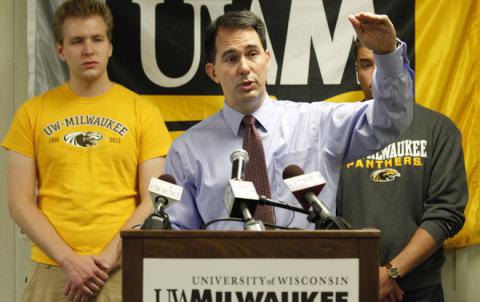Wisconsin's state budget may be out of balance by nearly $1.8 billion when the new two-year cycle begins next July, and for that you can thank Gov. Scott Walker's fiscal policies.
While the expected shortfall may end up being smaller — or larger — than it appears to be now, it's clear that a combination of Walker policies and lagging growth in tax revenue blew a hole in the state's finances. Walker or his challenger, Democrat Mary Burke, will have to close the budget gap in early 2015 through spending cuts, increases in taxes or fees or some combination of the two.
Walker plugged the last big budget gap — more than $3 billion — by reducing shared revenue to schools and local governments and then made up for much of the difference by cutting benefits and take-home pay for teachers, state workers and other public employees. The vehicle for those changes — the misguided Act 10 — sparked weeks of protests at the state Capitol and threw the state's politics into polarizing turmoil.
Not surprisingly, Burke pounced on the latest estimate from the nonpartisan Legislative Fiscal Bureau. The governor deflected criticism that he was a "one-trick pony" by noting that the estimated budget hole is based on the assumptions that there will be no economic growth, no change in policy to address it and no growth on account of inflation. It's important to understand that estimates are just that — estimates — and they help provide early guidance to government officials so that they can make mid-course corrections.
Though Burke is being politically opportunistic, she makes a good point when she chides the governor for passing up millions of additional health care dollars available through the Affordable Care Act. To make a political point, Walker turned down that money, arguing that he couldn't count on it being there in the future. It was a weak argument then and remains a weak argument now. Basically, Walker didn't like Obamacare as a matter of ideology — and acted accordingly to score points with Republicans.
Like other Republican governors, Walker should have taken the additional federal dollars to help fund the state's Medicaid programs.
Walker's tax policy struck us as politically motivated as well — a bet that tax cuts would play well as the re-election campaign neared. The governor and Republican allies reduced income taxes and property taxes across the board, as well as taxes on businesses. As a matter of politics, that might have been smart; as a matter of the budget, maybe not so much. Targeted tax cuts can be helpful — we've favored tax credits for investments in early stage companies, for example, but Walker's tax breaks went too far.
No one likes taxes, but government services cost money. And there is little evidence that tax cuts at the state level help juice a state's economy. A study in 2013 by the Center on Budget and Policy Priorities found deep cuts in income taxes to be "an approach that has not worked particularly well in the past and is not supported by the preponderance of the relevant academic literature."
In 2011, Walker could blame former Gov. Jim Doyle for his troubles. Not now. He has to own this.


Spread the word